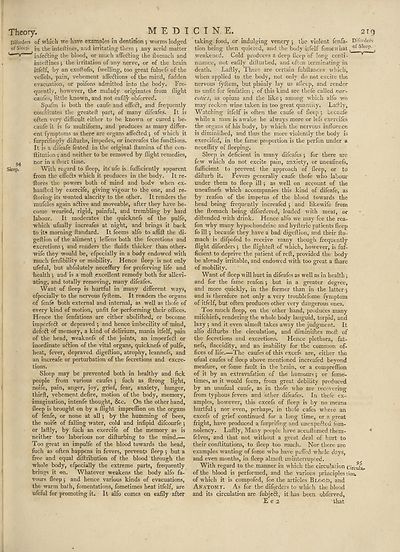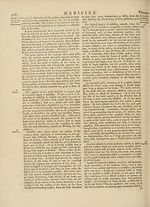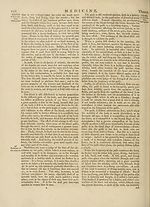Encyclopaedia Britannica, or, a Dictionary of arts, sciences, and miscellaneous literature : enlarged and improved. Illustrated with nearly six hundred engravings > Volume 13, MAT-MIC
(261) Page 219
Download files
Complete book:
Individual page:
Thumbnail gallery: Grid view | List view

Theory. M E D I
Diibrders of winch we have examples In dentition ; worms lodged
of Sleep. ;n the inteftines, and irritating them j any acrid matter
1— » infecting the blood, or much afFccting the ftomach and
inteftines; the irritation of any nerve, or of the brain
itfelf, by an exoftofis, fwelling, too great fulnefs of the
veffels, pain, vehement aflFeftions of the mind, fudden
evacuation, or poifons admitted into the body. Fre¬
quently, however, the malady originates from flight
caufes, little known, and not eaftly obferved.
Spaftn is both the caufe and effedt, and frequently
con ft i lutes the greateft part, of many difeafes. It is
often very difficult either to be known or cured; be-
eaufe it is fo multiform, and produces as many differ¬
ent fymptoms as there are organs affecfted j of which it
furpriftngly difturbs, impedes, or increafes the funsftions.
It is a difeafe feated in the original ftamina of the con-
ftitution •, and neither to be removed by flight remedies,
nor in a ftiori: time.
Sleep. Witli regard to fleep, its'ufe is fufficiently apparent
from the effe6ts which it produces in the body. It re-
llores the powers both of mind and bodv when ex-
haufted by exercife, giving vigour to the one, and re-
ftoring its wonted alacrity to the other. It renders the
mufcles again active and moveable, after they have be¬
come wearied, rigid, painful, and trembling by hard
labour. It moderates the quicknefs of the pulfe,
which ufually increafes at night, and brings it back
to its morning ftandard. It feems alfo to affift the di-
geftion of the aliment j leffens both the fecretions and
excretions •, and renders the fluids thicker than other-
wife they would be, efpecially in a body endowed with
much fenfibility or mobility. Hence fleep is not only
ufeful, but abfolutely neceffary for preferving life and
health *, and is a moft excellent remedy both for allevi¬
ating, and totally removing, many difeafes.
Want of fleep is hurtful in many different ways,
efpecially to the nervous fyftem. It renders the organs
of fenfe both external and internal, as well as thofe of
every kind of motion, unfit for performing their offices.
Hence the fenfations are either abolifhed, or become
imperfeft or depraved ", and hence imbecility of mind,
defeiff of memory, a kind of delirium, mania itfelf, pain
of the head, weaknefs of the joints, an imperfefl: or
inordinate aftion of the vital organs, quicknefs of pulfe,
heat, fever, depraved digeftion, atrophy, leannefs, and
an increafe or perturbation of the fecretions and excre¬
tions.
Sleep may be prevented both in healthy and fick
people from various caufes; fuch as ftrong light,
noife, pain, anger, joy, grief, fear, anxiety, hunger,
thirft, vehement defire, motion of the body, memory,
imagination, intenfe thought, &c. On the other hand,
fleep is brought on by a flight impreflion on the organs
of fenfe, or none at all ; by the humming of bees,
the noife of falling water, cold and infipid difeourfe ;
or laftly, by fuch an exercife of the memory as is
neither too laborious nor difturbing to the mind.—
Too great an impulfe of the blood towards the head,
fuch as often happens in fevers, prevents fleep ; but a
free and equal diftribution of the blood through the
whole body, efpecially the extreme parts, frequently
brings it on. Whatever weakens the body alfo fa¬
vours fleep 5 and hence various kinds of evacuations,
the warm bath, fomentations, fometimes heat itfelf, are
ufeful for promoting it. It alfo comes on eafily after
CINE. 219
taking food, or indulging venery ", the violent fenfa- Difordcrs
tion being then quieted, and the body itfelf fomewhat, 0l slccP- >
Aveakened. Cold produces a deep fleep of long conti¬
nuance, not eafily difturbed, and often terminating in
death. Laftly, There are certain fubftances which,
when applied to the body, not only do not excite the
nervous fyftem, but plainly lay us afieep, and render
us unfit for fenfaticn ) of this kind are thofe called nar¬
cotics, as opium and the like j among which alfo we
may reckon wine taken in too great quantity. Laftly,
Watching itfelf is often the caufe of fleep •, becaufe
while a man is awake he always more or lefs exercifes
the organs of his body, by which the nervous influence
is diminiffied, and thus the more violently the body is
exercited, in the fame proportion is the perfon under a.
neceflity of fleeping.
Sleep is deficient in many difeafes ; for there are
few which do not excite pain, anxiety, or uneafinefs,
fufficient to prevent the approach of fleep, or to
difturb it. Fevers generally caufe thofe who labour
under them to fleep ill $ as well on account of the
uneafinefs which accompanies this kind of difeafe, as
by reafon of the impetus of the blood towards the
head being frequently increafed ; and likewife from
the ftomach being difordered, loaded with meat, or
diftended with drink. Hence alfo we may fee the rea¬
fon why many hypochondriac and hyfteric patients fleep
fo ill; becaufe they have a bad digeftion, and their fto¬
mach is difpofed to receive many though frequently
flight diforders *, the flighteft of which, however, is fnf-
ficient to deprive the patient of reft, provided the body
be already irritable, and endowed with too great a lhare
of mobility.
Want of fleep will hurt in difeafes as well as in health",
and for the fame reafon", but in a greater degree,
and more quickly, in the former than in the latter j
and is therefore not only a very troublefome fyniptom
of itfelf, but often produces other very dangerous ones.
Too much fleep, on the other hand, produces many
mifehiefs, rendering the whole body languid, torpid, and
lazy; and it even almoft takes away the judgment. It
alfo difturbs the circulation, and diminiflies moft of
the fecretions and excretions. Hence plethora, fat-
nefs, flaccidity, and an inability for the common of¬
fices of life.—The caufes of this excefs are, either the
ufual caufes of fleep above mentioned increafed beyond
meafure, or fome fault in the brain, or a compreflion
of it by an extravafation of the humours; or fome¬
times, as it would feem, from great debility produced
by an unufual caufe, as in thofe who are recovering
from typhous fevers and other difeafes. In thefe ex¬
amples, however, this excefs of fleep is by no means
hurtful; nor even, perhaps, in thofe cafes whete an
excefs of grief continued for a long time, or a great
fright, have produced a furprifing and unexpefted fom-
nolency. Laftly, Many people have accuftomed them-
felves, and that not without a great deal of hurt to
their conftitutions, to fleep too much. Nor there are
examples wanting of fome who have paffed whole days,
and even months, in fleep almoft uninterrupted.
With regard to the manner in which the circulation Circula-
of the blood is performed, and the various principles tion,
of which it is compofed, fee the articles Blood, and
Anatomy. As for the diforders to which the blood
and its circulation are fubjeef, it has been obferved,
E e 2 that
Diibrders of winch we have examples In dentition ; worms lodged
of Sleep. ;n the inteftines, and irritating them j any acrid matter
1— » infecting the blood, or much afFccting the ftomach and
inteftines; the irritation of any nerve, or of the brain
itfelf, by an exoftofis, fwelling, too great fulnefs of the
veffels, pain, vehement aflFeftions of the mind, fudden
evacuation, or poifons admitted into the body. Fre¬
quently, however, the malady originates from flight
caufes, little known, and not eaftly obferved.
Spaftn is both the caufe and effedt, and frequently
con ft i lutes the greateft part, of many difeafes. It is
often very difficult either to be known or cured; be-
eaufe it is fo multiform, and produces as many differ¬
ent fymptoms as there are organs affecfted j of which it
furpriftngly difturbs, impedes, or increafes the funsftions.
It is a difeafe feated in the original ftamina of the con-
ftitution •, and neither to be removed by flight remedies,
nor in a ftiori: time.
Sleep. Witli regard to fleep, its'ufe is fufficiently apparent
from the effe6ts which it produces in the body. It re-
llores the powers both of mind and bodv when ex-
haufted by exercife, giving vigour to the one, and re-
ftoring its wonted alacrity to the other. It renders the
mufcles again active and moveable, after they have be¬
come wearied, rigid, painful, and trembling by hard
labour. It moderates the quicknefs of the pulfe,
which ufually increafes at night, and brings it back
to its morning ftandard. It feems alfo to affift the di-
geftion of the aliment j leffens both the fecretions and
excretions •, and renders the fluids thicker than other-
wife they would be, efpecially in a body endowed with
much fenfibility or mobility. Hence fleep is not only
ufeful, but abfolutely neceffary for preferving life and
health *, and is a moft excellent remedy both for allevi¬
ating, and totally removing, many difeafes.
Want of fleep is hurtful in many different ways,
efpecially to the nervous fyftem. It renders the organs
of fenfe both external and internal, as well as thofe of
every kind of motion, unfit for performing their offices.
Hence the fenfations are either abolifhed, or become
imperfeft or depraved ", and hence imbecility of mind,
defeiff of memory, a kind of delirium, mania itfelf, pain
of the head, weaknefs of the joints, an imperfefl: or
inordinate aftion of the vital organs, quicknefs of pulfe,
heat, fever, depraved digeftion, atrophy, leannefs, and
an increafe or perturbation of the fecretions and excre¬
tions.
Sleep may be prevented both in healthy and fick
people from various caufes; fuch as ftrong light,
noife, pain, anger, joy, grief, fear, anxiety, hunger,
thirft, vehement defire, motion of the body, memory,
imagination, intenfe thought, &c. On the other hand,
fleep is brought on by a flight impreflion on the organs
of fenfe, or none at all ; by the humming of bees,
the noife of falling water, cold and infipid difeourfe ;
or laftly, by fuch an exercife of the memory as is
neither too laborious nor difturbing to the mind.—
Too great an impulfe of the blood towards the head,
fuch as often happens in fevers, prevents fleep ; but a
free and equal diftribution of the blood through the
whole body, efpecially the extreme parts, frequently
brings it on. Whatever weakens the body alfo fa¬
vours fleep 5 and hence various kinds of evacuations,
the warm bath, fomentations, fometimes heat itfelf, are
ufeful for promoting it. It alfo comes on eafily after
CINE. 219
taking food, or indulging venery ", the violent fenfa- Difordcrs
tion being then quieted, and the body itfelf fomewhat, 0l slccP- >
Aveakened. Cold produces a deep fleep of long conti¬
nuance, not eafily difturbed, and often terminating in
death. Laftly, There are certain fubftances which,
when applied to the body, not only do not excite the
nervous fyftem, but plainly lay us afieep, and render
us unfit for fenfaticn ) of this kind are thofe called nar¬
cotics, as opium and the like j among which alfo we
may reckon wine taken in too great quantity. Laftly,
Watching itfelf is often the caufe of fleep •, becaufe
while a man is awake he always more or lefs exercifes
the organs of his body, by which the nervous influence
is diminiffied, and thus the more violently the body is
exercited, in the fame proportion is the perfon under a.
neceflity of fleeping.
Sleep is deficient in many difeafes ; for there are
few which do not excite pain, anxiety, or uneafinefs,
fufficient to prevent the approach of fleep, or to
difturb it. Fevers generally caufe thofe who labour
under them to fleep ill $ as well on account of the
uneafinefs which accompanies this kind of difeafe, as
by reafon of the impetus of the blood towards the
head being frequently increafed ; and likewife from
the ftomach being difordered, loaded with meat, or
diftended with drink. Hence alfo we may fee the rea¬
fon why many hypochondriac and hyfteric patients fleep
fo ill; becaufe they have a bad digeftion, and their fto¬
mach is difpofed to receive many though frequently
flight diforders *, the flighteft of which, however, is fnf-
ficient to deprive the patient of reft, provided the body
be already irritable, and endowed with too great a lhare
of mobility.
Want of fleep will hurt in difeafes as well as in health",
and for the fame reafon", but in a greater degree,
and more quickly, in the former than in the latter j
and is therefore not only a very troublefome fyniptom
of itfelf, but often produces other very dangerous ones.
Too much fleep, on the other hand, produces many
mifehiefs, rendering the whole body languid, torpid, and
lazy; and it even almoft takes away the judgment. It
alfo difturbs the circulation, and diminiflies moft of
the fecretions and excretions. Hence plethora, fat-
nefs, flaccidity, and an inability for the common of¬
fices of life.—The caufes of this excefs are, either the
ufual caufes of fleep above mentioned increafed beyond
meafure, or fome fault in the brain, or a compreflion
of it by an extravafation of the humours; or fome¬
times, as it would feem, from great debility produced
by an unufual caufe, as in thofe who are recovering
from typhous fevers and other difeafes. In thefe ex¬
amples, however, this excefs of fleep is by no means
hurtful; nor even, perhaps, in thofe cafes whete an
excefs of grief continued for a long time, or a great
fright, have produced a furprifing and unexpefted fom-
nolency. Laftly, Many people have accuftomed them-
felves, and that not without a great deal of hurt to
their conftitutions, to fleep too much. Nor there are
examples wanting of fome who have paffed whole days,
and even months, in fleep almoft uninterrupted.
With regard to the manner in which the circulation Circula-
of the blood is performed, and the various principles tion,
of which it is compofed, fee the articles Blood, and
Anatomy. As for the diforders to which the blood
and its circulation are fubjeef, it has been obferved,
E e 2 that
Set display mode to:
![]() Universal Viewer |
Universal Viewer | ![]() Mirador |
Large image | Transcription
Mirador |
Large image | Transcription
Images and transcriptions on this page, including medium image downloads, may be used under the Creative Commons Attribution 4.0 International Licence unless otherwise stated. ![]()
| Permanent URL | https://digital.nls.uk/192664555 |
|---|
| Attribution and copyright: |
|
|---|
| Description | Ten editions of 'Encyclopaedia Britannica', issued from 1768-1903, in 231 volumes. Originally issued in 100 weekly parts (3 volumes) between 1768 and 1771 by publishers: Colin Macfarquhar and Andrew Bell (Edinburgh); editor: William Smellie: engraver: Andrew Bell. Expanded editions in the 19th century featured more volumes and contributions from leading experts in their fields. Managed and published in Edinburgh up to the 9th edition (25 volumes, from 1875-1889); the 10th edition (1902-1903) re-issued the 9th edition, with 11 supplementary volumes. |
|---|---|
| Additional NLS resources: |
|

